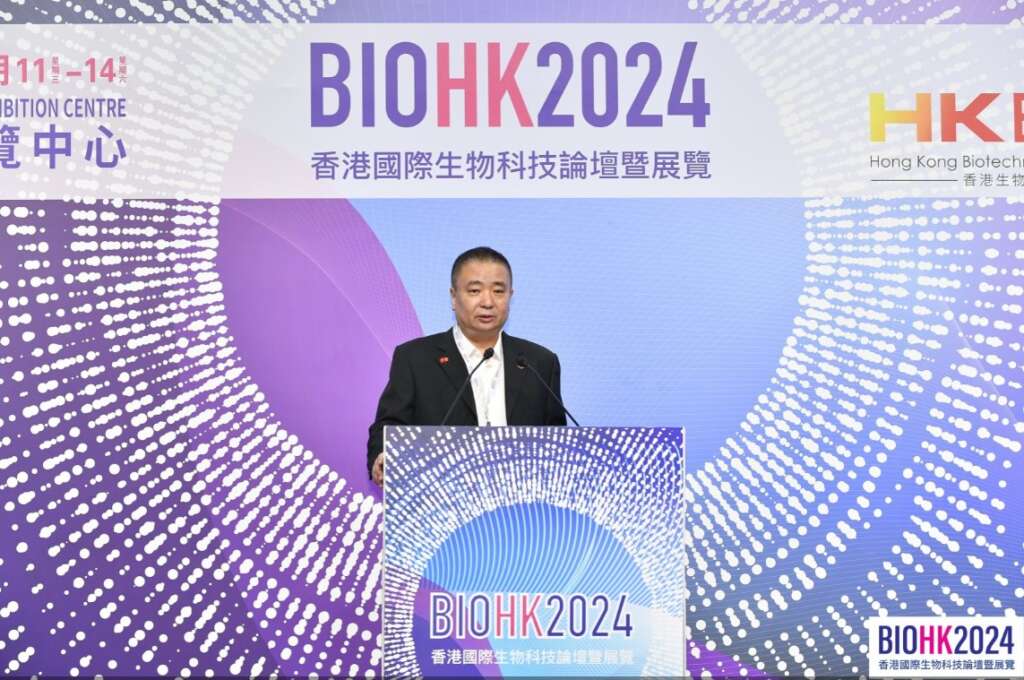Shanghai-based Fudan University has accelerated its efforts on biotech scientific exploration and decoding of life sciences to enhance precision medicine and healthcare management, as well as grooming more top-notch talents.
Delivering a keynote speech on the closing day of the BIOHK 2024 conference, Fudan University’s President Jin Li (金力校長) said that the institution has been engaging in the International Human Phenome Project (人類表型組研究) – which collects a set of measurable traits, including the physical, chemical and biological characteristics of individuals and population in China.

A phenome is the set of all traits expressed by an organism, cell and tissue. Having started in 2018, the project has gathered deep phenotyping in about 1,000 volunteers in Shanghai and phenotyping in disease cohorts of some 10,000 people in China. Hopefully the project will be expanded to collect data from volunteers in overseas countries in mid and long-term goals.
President Jin said the collection of the data will help unlock mysteries of human genes and contribute to the development of precision medicine and enhance healthcare management. His main research areas focus on genetic structure and migrations of human populations, genetics of human complex diseases and computational biology.

President Jin added that the Fudan University has also embraced the strategies of enhancing high-quality education, technological innovation and grooming more young science and biotech talents to contribute to national development, whereas the institution will become a world-class university.
WESTERN AND TRADITIONAL CHINESE MEDICINE
In another keynote speech, Ji Yonghua (吉永華), Chinese medicine practitioner and a special researcher of Hebei University, said traditional Chinese medicine (TCM) has been gaining greater recognition worldwide, both in clinical practice and as a focus of scientific research.

Ji said Chinese medicine practitioners have to map out ways to enhance people’s understanding in the international community on TCM from modern medical and scientific perspectives, and step up exploring the combination of TCM and Western medicine.
Meanwhile, there are various panel sessions covering different topics, including “Navigating careers in biotech” and “Smart living: Digital innovation for healthy living” on the day.
In the session on “Navigating careers in biotech” , biotech firms’ entrepreneurs and academics have shared their experiences for young people and students, who major in biochemical and scientific subjects in universities, on how to develop their career paths. Hundreds of universities students and interns working in biotech firms have joined the panel session.

Jason Ho, Vice President and Head of Corporate Development of Phase Scientific, has shared his experience on how he has changed his career path from a practising lawyer to become a biotech expert. Some students have asked about career transition from business and marketing fields to biotech.
“In current information age, there is not something you cannot learn by yourself. I read medical journals, scientific papers and studied masters on biotech spectrum after completing my degree in laws,” Ho said.
“What you can equip yourself is learning skills. The way I try to tackle a new discipline is that we all need to learn new things and deep dive. You can find best resources online, social media and YouTube. When you have studied courses online, you will have very comprehensive understanding on how the world works in different disciplines,” he said.
On top of that, people who want to change their career paths to biotech field must have the courage and determination and all these are related to passion and hard works, he added.

Another panelist Stephen Chan, private equity investor of Tybourne Capital, which is a hedge fund based in Hong Kong, said students who are interested in biotech investment can look at more news on biotech start-ups, how companies develop new drugs and pay heed to more news on biotech companies listed on the stock market in Hong Kong and Nasdaq in the US.
Images are from the BIOHK 2024.
